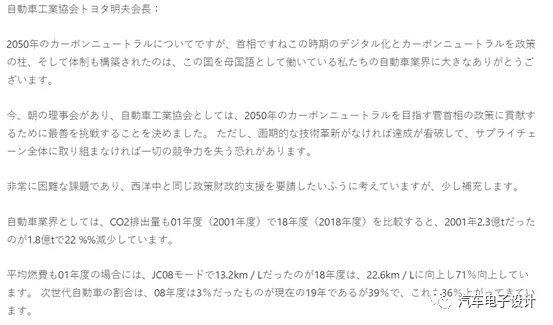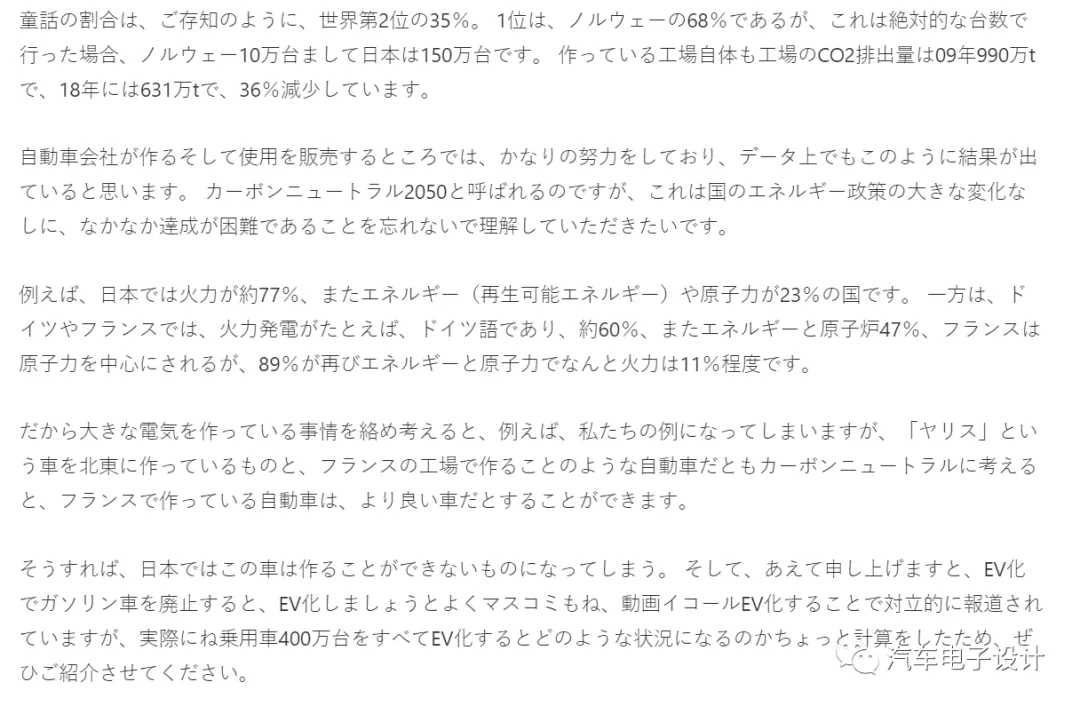Introduction
Recently, the comments made by Toyota’s CEO regarding electric vehicles have caused some controversy. To fully understand the issue, we must examine the content of his statements and the scope of the topic. Essentially, the issue pertains to whether Toyota’s acceleration from hybrid to electric vehicles can meet the current demands of major markets such as Europe and China. Secondly, it pertains to Tokyo and the Japanese government’s view on setting guidelines to limit the development of fuel vehicles as a whole. In my understanding, there are several points that Toyota’s CEO, Akio Toyoda, wanted to convey:
1) Japan has set carbon emission goals similar to those of Europe, and has declared a relatively aggressive transformation of the transportation industry. This will require the government to put efforts into infrastructure, subsidies, and the power energy structure.
2) Secondly, this will have a huge impact on the supply chain and overall structure of Japan’s automotive industry. This is also a point raised by the Japanese government.
What was actually said?
This is the original text in Japanese that I found:



Here are some of the key points from the article excerpted by the American media:
Toyota Motor Corp.’s leader criticized what he described as excessive hype over electric vehicles, saying advocates failed to consider the carbon emitted by generating electricity and the costs of an EV transition.# Toyota President Warns of Electric Vehicle Strain on Japan’s Energy Supply
At a year-end news conference held by the Japan Automobile Manufacturers Association, Toyota President Akio Toyoda raised concerns over the ability of Japan’s infrastructure to support a shift to electric-powered vehicles. Mr. Toyoda stated that if all cars in Japan were running on electric power, the country would run out of electricity in the summer. He estimated that the cost of the required infrastructure to support a fleet consisting entirely of electric vehicles would range from ¥14 trillion to ¥37 trillion, equivalent to $135 billion to $358 billion.
“When politicians are out there saying, ‘Let’s get rid of all cars using gasoline,’ do they understand this?” questioned Mr. Toyoda.
The discussion also touched on Japan’s greenhouse gas emissions target, and CO2 emissions reduction in the automotive industry. CO2 emissions in the industry have dropped 22% from 2001 to 2018, with average fuel efficiency increasing 71%. The proportion of xEV cars has risen from 3% in 2008 to 39% in 2019.
However, achieving a fully electric vehicle fleet could prove challenging without significant changes to Japan’s energy policies. Currently, Japan relies on thermal power for approximately 77% of its energy, with renewable energy and nuclear power making up the remaining 23%. In comparison, European countries like Germany and France rely on renewable energy and nuclear power for 47% and 89% of their energy supply, respectively.From the perspective of power supply, if all cars sold in Japan were replaced with pure electric cars, the demand for electricity during the summer peak period would increase dramatically. This would require Japan to build about 10 new nuclear power plants, which must be solved by the national energy policy. Under these conditions, the “business model of existing Japanese car companies in the Japanese market may collapse”, which will have a relatively large impact on employment. On the charging facility side, it is necessary to add about 14-37 trillion yen to supplement infrastructure.
Why are we talking about this?
My understanding is that Toyota’s statement this time is mainly to negotiate with the Japanese government. Currently, European governments (the two main car-producing countries Germany and France), the US government (Biden’s next step), and the South Korean government are all providing a lot of resources and policies for the development of electric cars in the overall energy structure and the transformation of the automotive industry.
We can understand that the policy and financial toolbox used by China in the early development of new energy vehicles is needed by all traditional automobile companies that want to transform into BEVs, that is, they need a local support outside the third-party market. The environment for Japanese car companies to do HEVs is different. At this stage, it is very difficult for Japanese car companies to promote BEVs in various markets.

Summary
In my personal opinion, in order for all car companies to promote electric vehicles, aside from the internal profitability and transformation rationality, it is necessary to explore the help needed in the transformation process with the government, including subsidies, charging facilities, and support needed to change the parts industry chain.
In this sense, promoting the development of electric vehicles actually depends on whether the governments of various countries that mainly revolve around the automotive industry are willing to come down and help. To some extent, it is also a key point in time when traditional car companies need external support in transformation.
This article is a translation by ChatGPT of a Chinese report from 42HOW. If you have any questions about it, please email bd@42how.com.
